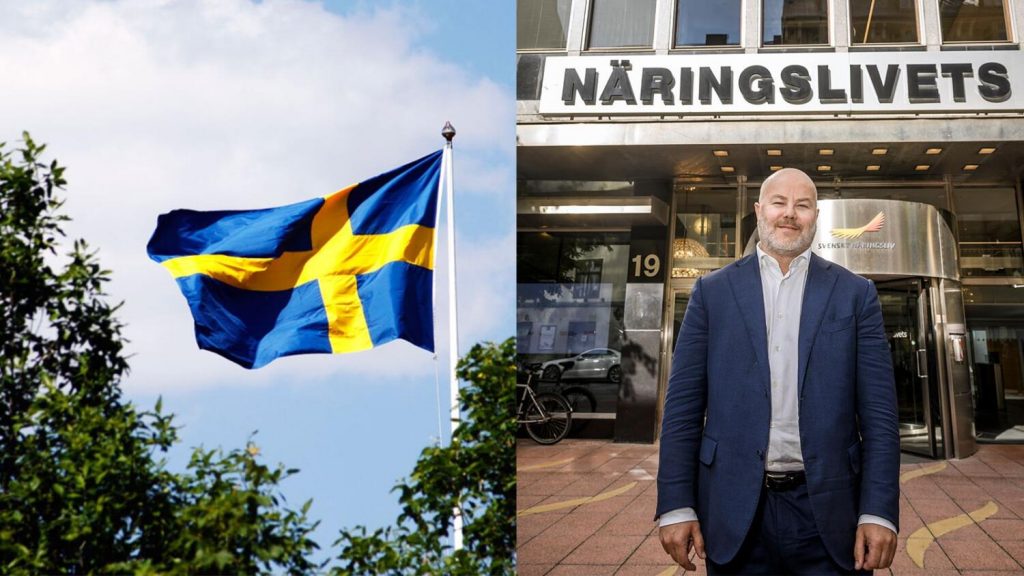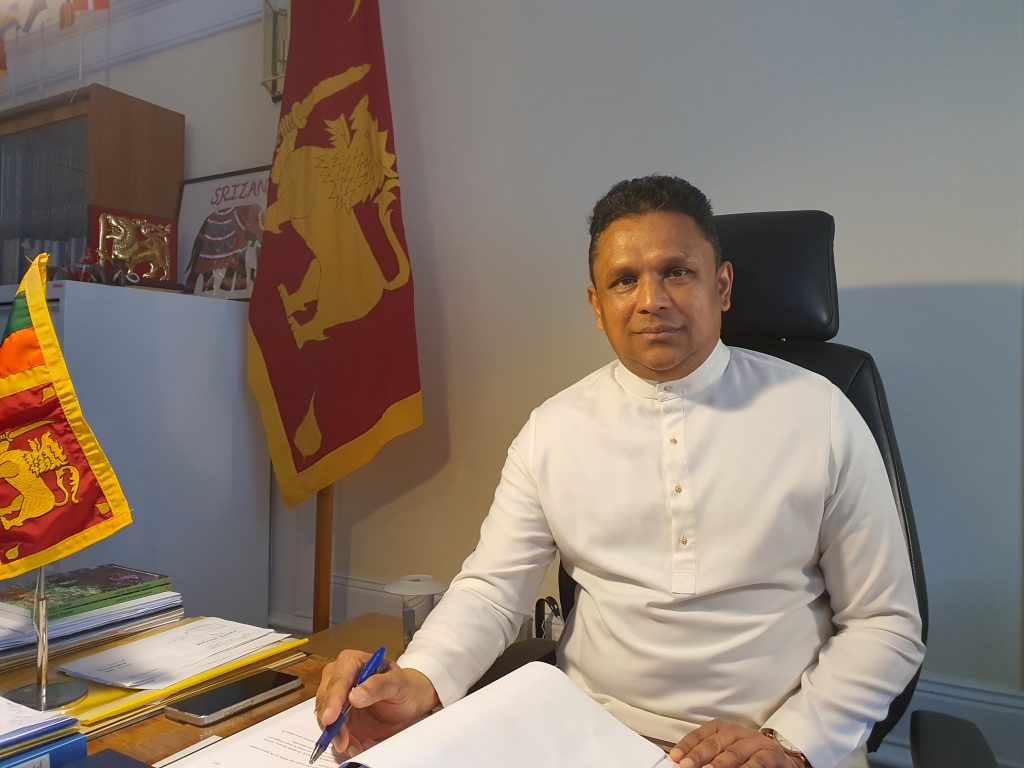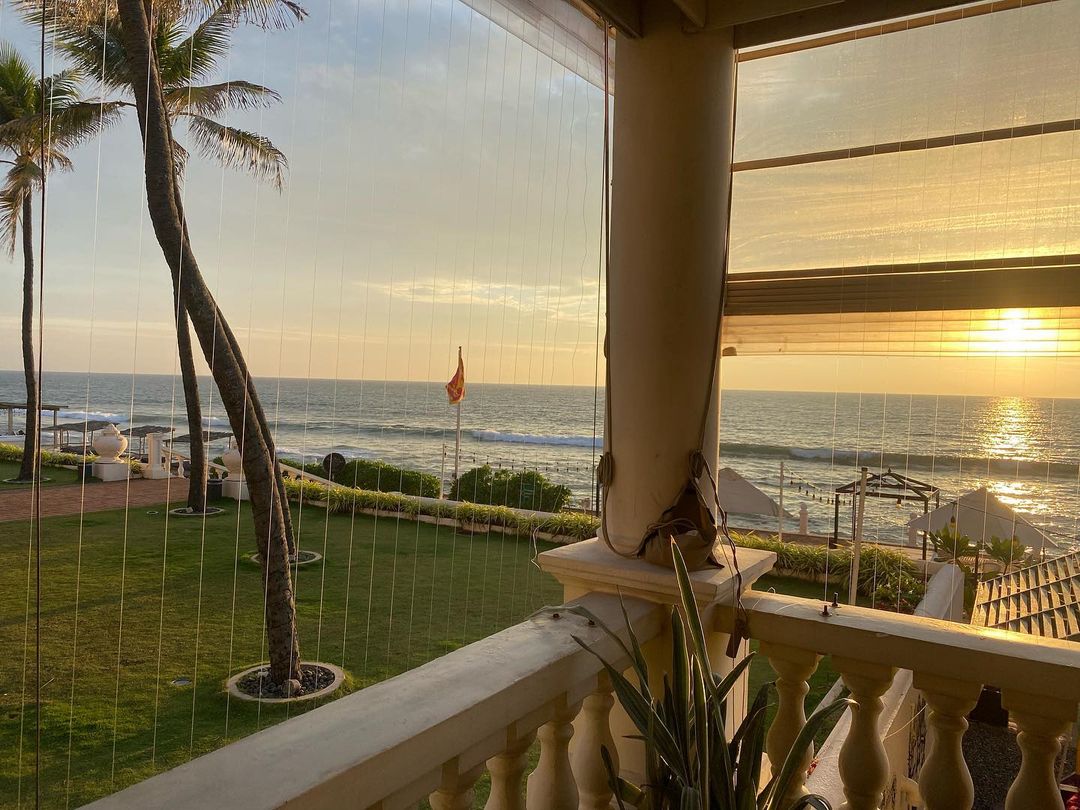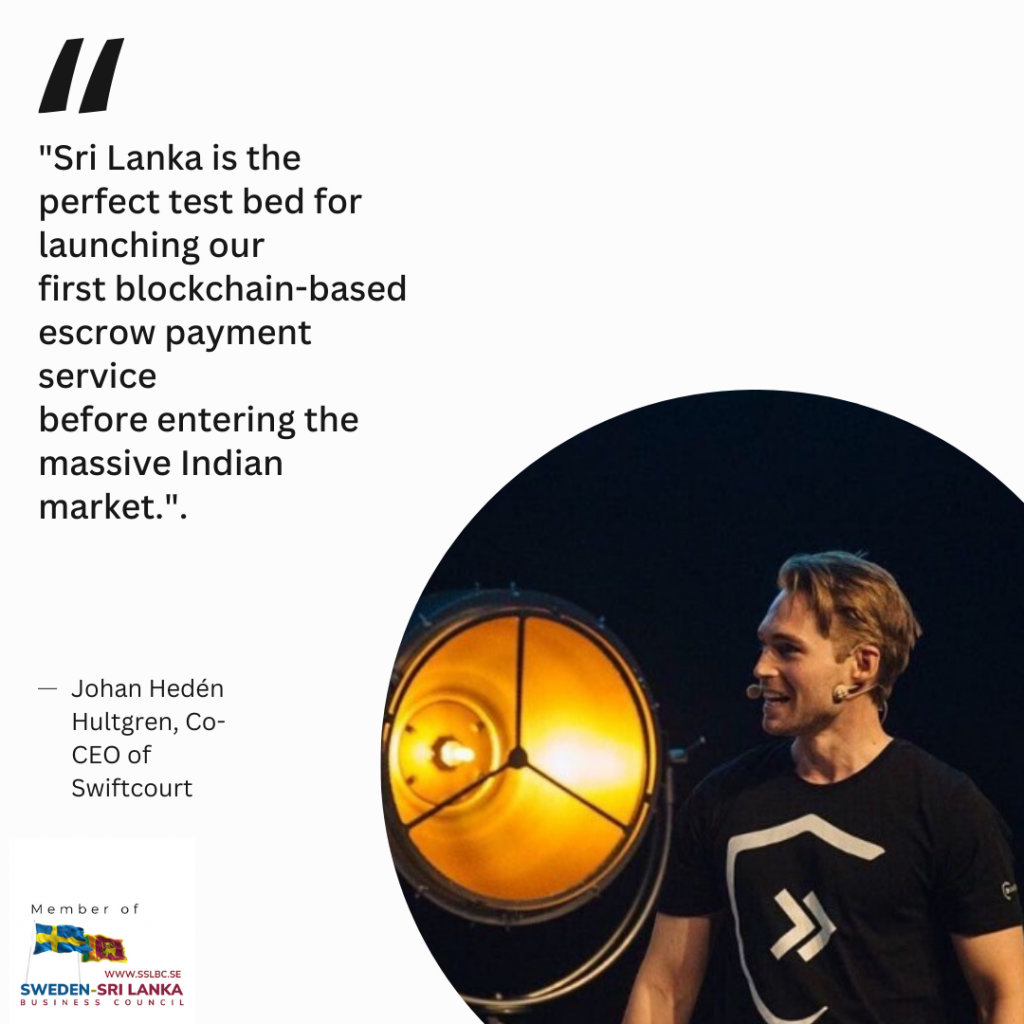Latest ECCSL Magazine article about Sweden-Sri Lanka can be found at page 17
Swiftcourt entering the Sri Lanka market with Blockchain-Enabled
Escrow Payment Service supported by XVC Tech & the XDC Network
German Newsletter
Our German sister organisation produces a very interesting newsletter
The Chief Economist: The economy is about to turn around
Although times are still tough, businesses are more optimistic about the future, a new survey shows. ”It could be an indication that things will soon turn,” says Sven-Olov Daunfeldt, chief economist at Swedish Enterprise.

In the current recession, many companies are fighting for their survival and this can be seen, among other things, in an increased number of bankruptcies, increased notices and rising unemployment. But in Svenskt Näringsliv’s survey, the Business Panel, an increased faith in the future is noticeable.
- When we ask the companies about their expectations about the future, we see that there has been a turnaround and they are much more optimistic about the future now than they have been before, says Sven-Olov Daunfeldt, Chief Economist at Svenskt Näringsliv.
According to the business panel, among other things, the risk of notice has decreased. By the end of 2023, 28 percent of companies stated that there was a risk that they would need to notify staff within the next six months. Now it has dropped to 20 percent.
In addition, the same positive trend can be seen when it comes to labor hoarding, that is, when companies have more staff than they actually need in the short term. 30 percent of companies stated at the end of last year that they had more staff than they needed, now that figure is down to 23 percent.
- If you ask about the companies’ expectations for the future, they are basically at a normal level now. It could be an indication that things will turn around soon.
There are also positive signals on the labor market. For example, when it comes to expectations about the number of employees a year from now, the figure lands at 12 percent when you look at the net total, i.e. the percentage of companies that believe in an increase minus the percentage that believe in a decrease. When the companies assess the need to hire compared to 12 months ago, the figure lands at minus 6 percent.
But at the same time, times are still tough. Apart from the pandemic, investments have not been this low since the financial crisis in 2009, according to measurements from Swedish Enterprise. The net number in terms of how companies’ investments have developed over the past year is negative (minus 5). But expectations around investments are expected to increase in a year’s time, the net figure of 7 percent shows. Sven-Olov Daunfeldt believes that the fight against inflation is over and that companies’ positive faith in the future depends on the Riksbank’s interest rate cut.
- We saw quite quickly that the situation became more optimistic after the Riksbank announced at the beginning of spring that they intended to start with interest rate cuts. The companies see that there may be further interest rate cuts and this instills hope that the economy will turn around.
But even if the companies see a light at the end of the tunnel, it is still uncertain when the economy will turn around, he believes.
- There is a lot of psychology in economics and the companies believe that things will get better and they start to invest more and the economy will also turn around. Our surveys show that companies have become more optimistic and this is usually a sign that the economy is about to turn around.
Although the pandemic, the war in Ukraine and a recession have hit many companies hard, it has not affected their faith in the future negatively, he believes. - Many companies have had an extremely tough time, but I believe that it has not negatively affected the companies’ view of the future. Entrepreneurs are generally positive people who prepare themselves for crises and they try to see opportunities in everything.
However, policy has changed as a result of the crises and there is now a greater focus on temporary measures, he believes.
- We have seen a lot of crisis politics and we have to get rid of that. It is not good, but we have to let the market work by itself. Firms that are not productive must be driven out of the market and replaced by other firms that are more productive and more competitive.
- That’s how we get the economy to work well and that’s how we get growth and productivity.
The absolutely most important thing going forward is to use Sweden’s state finances to invest in, among other things, infrastructure and to create a better functioning labor market so that companies can hire the skills they demand, he believes.
- Now politics needs to create the conditions for us to get a stronger growth force in the Swedish economy so that we can get higher growth and productivity in the Swedish business life.
- The skills crisis is still a huge problem, even though we are now in a recession. Now we have to invest in making the companies grow.
Newsletter ECCSL
Latest newsletter from our sisterorganization ECCSL
“India Ocean Rim Association (IORA) Business Conclave – 2024”
“India Ocean Rim Association (IORA) Business Conclave – 2024” will be held from 28th to 29th May 2024 at the Shangri-La Colombo, Sri Lanka.
The Conclave will focus on bringing potential Investors including business partners to Sri Lanka in Agriculture, Renewable Energy, ICT, Logistics, SME & Women Empowerment and Tourism.
The two-day event will feature a Strategic Networking Reception on the 28th May and Panel Discussions and Breakout Sessions followed by B2B meetings on 29th May on selected topics as per the IORA Charter on “Sustainable Development”. Field visits upon request of the delegates will be organised on 30th May, 2024. A Brochure is attached herewith.
The Business Conclave will be organized by the Ceylon Chamber of Commerce with the Ministry of Foreign Affairs, Board of Investment of Sri Lanka, the Department of Commerce and the Sri Lanka Export Development Board.
Sri Lankan Airlines has offered to all participants and accompanying persons up to 10% discount on Economy Class airfare and up to 15% discount on Business Class airfare.
Online registration/payment facility could be accessed via :
INSIDE ASIA’S POPULATION SHIFT
The past six decades have been marked by unprecedented population growth. By 2050, some 9.7 billion people are expected to inhabit the plant, but the number of working aged people will differ considerably around the world.
This study explores three global trends – the working age shift, the elderly boom and the urbanisation wave – based on an analysis of 5,000 data points on demographic changes coupled with company interviews.
Zooming in on Asia, the report presents three future scenarios until 2050 that will impact economic growth and the prospects for Swedish exports in the years ahead.
Newsletter German Chamber in Sri Lanka
Newsletter ECCSL
March 2024 newsletter from our sister organisation the European Chamber of Commerce in Sri Lanka. SSLBC has contributed with one article.
3 questions for Dharshana M. Perera, Sri Lanka’s ambassador to the Nordic and Baltic countries
3 questions for Dharshana M. Perera, who in March 2024 will take on a new post at the Ministry of Foreign Affairs in Colombo, ending three intense years as Sri Lanka’s Ambassador to the Nordic and Baltic countries. Dharshana M. Perera has a long diplomatic career and prior to his career in diplomacy had worked as an academic and in the international Sri Lankan business community.

What do you take away from your three years as Ambassador to the New Nordics?
Among the important features I observed, were the values Sri Lanka shares with the region we refer to as the New Nordics which is covered by the Embassy in Stockholm. It includes Sweden, Denmark, Finland, Iceland, Norway, Lithuania, Latvia and Estonia. Shared values of democracy, open economic orientation as well as the climate & environment are so critical to our societies to nurture. Sri Lanka is one of the oldest democracies in Asia and we share this heritage with this region. We are also open, export-oriented economies. We share similar views on climate and environment – deeply committed to reaching climate goals. This is a solid foundation for generating business with Sri Lanka and I am pleased to see that this area has particularly strengthened in recent years.
Foreign Minister, Hon. Ali Sabry, discussion in May 2023, significantly elevated the Bilateral engagement with Sweden with good outcomes from his meetings with Speaker, H.E. Andreas Norlén, and Swedish Foreign Minister H.E. Tobias Billström.
The Indo-Pacific EU Ministerial Meeting hosted by Sweden at the time was a significant opportunity for Sri Lanka’s engagement with the EU, placing Sri Lanka in the heart of the EU-Indo Pacific dialogue. His meetings with the SSLBC, top-level business executives in Stockholm and the business community as well as the Sri Lankan community added to the depth and breadth of our engagement.
Several Swedish companies have operations in Sri Lanka. How can relations be further developed?
Sweden has been and is an important partner to Sri Lanka. We established formal diplomatic relations 75 years ago, just a little over a year after Sri Lanka regained independence. The Kotmale hydroelectric dam symbolizes the excellent partnership in development cooperation. The dam was built by the international Swedish construction company Skanska financed by SIDA. It continues to provide electricity- a clean form of energy – and contributes to important irrigation solutions for agriculture and livelihoods. We are committed to ensure that by 2030, 70 % of Sri Lanka’s energy needs are renewable. But, this requires different partnerships, both in terms of investment financing and construction. Solar, wind and green hydrogen are where I see several openings for Swedish companies. Additionally, there is a valuable opportunity in the IT-sector. Several Swedish IT companies have long had important parts of their operations located in Sri Lanka. As Swedish IT company, IFS, has described Sri Lanka is ”the backbone of its global operations” and “the jewel in the IFS crown”. Other IT companies include Cambio, SoftOne, Ascentic, e-Builder and several others. Sri Lanka can be a catalyst in raising competitiveness of Swedish businesses by meeting the IT and tech needs which are in short supply, especially in AI and other sectors. The multifaceted, diverse, compact, all-year-round destination is another area for a stronger partnership with the New Nordic Region. Sri Lanka’s tourism product really does encapsulate Asia in one Island. Apart from the Embassy, Sweden Sri Lanka businesses including the Sweden-Sri Lanka Business Council (SSLBC) have an important role to play and be a strong voice for business and to raise awareness of the business opportunities in several sectors. Sri Lanka and I personally are grateful for the very productive collaboration we have with the President at the SSLBC, Jan Campbell, and his team of the SSLBC.
Can business relations with Sri Lanka also be strengthened in Sweden?
The past year has been particularly successful in the business pillar. Firstly, in partnership with Innovation Lab, Copenhagen, the Export Development Board and SLASSCOM, the Embassy at the Consulate in Gothenburg in May/June 2023 organized the IT Nordic Mission in the respective cities. Following the release of the IT Eco System IT Industry Report in Copenhagen and the engagement with the business partners in the three major cities, several IT and technology partnerships were established. This builds upon the excellent Sweden-Sri Lanka IT-related business enterprise we have.
Secondly, the Embassy was part of the team which conceptualized and facilitated the multi-tiered initiative on CleanTech transport, Clean Energy systems, e-mobility and IT which led to the establishment of a ground breaking partnership between one of Sri Lanka’s most diversified IT conglomerates – OREL IT – and Gothenburg’s ANODOX. The agreements were signed in October 2023. This was followed by a soft launch in Gothenburg. It will link the country into the EV battery global supply network. This project, amongst others, symbolizes the untapped potential for business which exists between the two countries and the region, bringing together synergies with Sri Lanka. We had excellent support from facilitators such as MobilityGuard, Gothenburg. The Mayor of Partille Municipality and Business Region Gothenburg support the partnership.
In summary, Sri Lanka can be an excellent partner with the region to sharpen the competitiveness and to diversify supply networks in a range of business pillars. The well-educated, highly skilled, English speaking talent pool with good business practice makes this engagement robust for long term mutually beneficial business partnerships.
Naturally, we and our partners are enthused about celebrating 75 years of diplomatic relations in 2024 – the anniversary which falls on 19th November this year.

